|
|
|
Sort Order |
|
|
|
Items / Page
|
|
|
|
|
|
|
| Srl | Item |
| 1 |
ID:
061463
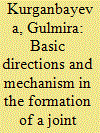

|
|
|
|
|
| Publication |
Jan-Mar 2005.
|
|
|
|
|
|
|
|
|
|
|
|
|
|
|
|
| 2 |
ID:
128117
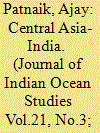

|
|
|
|
|
| Publication |
2013.
|
| Summary/Abstract |
Revival of the 'Silk Road' or Silk Road Strategy is a fashionable terms now days, even in Indian academic circles. Of course the word has been used more extensively by American and Chinese scholars. This began with the US Silk Road Strategy act of 1999, which talked of transporting the Central Asian region's natural resources to the international market.
|
|
|
|
|
|
|
|
|
|
|
|
|
|
|
|
| 3 |
ID:
143042
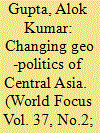

|
|
|
|
|
| Summary/Abstract |
Conflict shall neither serve the purpose of East nor even of the west, but obviously it may serve the purpose of terrorist organizations and all at the cost of severe human rights violations of the common and innocent citizens of the Central Asian region. Hence, oil, gas, geopolitics and terrorism create rigmarole.
|
|
|
|
|
|
|
|
|
|
|
|
|
|
|
|
| 4 |
ID:
145832
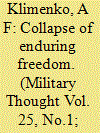

|
|
|
|
|
| Summary/Abstract |
The author discusses security on the landmass taken up by the member countries of the Shanghai Cooperation Organization (SCO) and closely scrutinizes Islamic fundamentalism dressing up in our times as the Islamic State (of Iraq and Levant, or Syria, to give the full unabbreviated name of ISIS), the Taliban, or whatever names its proponents choose to call it - that is raising its head in Afghanistan after the failure of Operation Enduring Freedom and withdrawal of the Western coalition's main forces from that country, and sheds light on the U.S.'s ill-fated role in the erosion of stability in the region. The author also argues for the need to strengthen the SCO's military arm to keep its enormous expanses secure and stable, and offers his recommendations on enhancing the Organization's power and capabilities to give its members a sense of protection and security.
|
|
|
|
|
|
|
|
|
|
|
|
|
|
|
|
| 5 |
ID:
085246
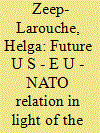

|
|
|
| 6 |
ID:
142911
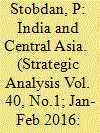

|
|
|
|
|
| Summary/Abstract |
India was always aware of the enormous energy reserves within its geographically proximate Central Asian region that could potentially fulfil its energy demands. The recent visit by Prime Minister Modi to the region has proved critical in paving the way for India to finally acquire a long awaited energy stake in the region. The new developments could not have been possible without the evolving undercurrents of the new geopolitical balance of power in the region. Russia seems to be playing a conspicuous role in nudging both India and Pakistan towards cooperation in the energy pipeline. However, there is no case to be euphoric on this front. India’s energy diplomacy in Central Asia will fail if it continues to discount the Russia factor in its policy.
|
|
|
|
|
|
|
|
|
|
|
|
|
|
|
|
| 7 |
ID:
190176
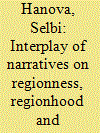

|
|
|
|
|
| Summary/Abstract |
This paper identifies the interplay between narratives on Central Asia as a region. It compares European Union (EU) narratives with those of the five post-Soviet states of Kazakhstan, Kyrgyzstan, Tajikistan, Turkmenistan and Uzbekistan. By doing so, it investigates the manifestations of narratives, stories and narrators who continue to construct and convey certain discourses about the region, comparing EU discourse and that of the local political elites in Central Asia, respectively. By looking at official discourse conveyed by the presidents of the countries and in key foreign policy documents, the interplay of narratives as dialogues between narrators is analysed, thus expanding into ideational analysis, an emerging trend in the literature on post-Soviet Central Asia.
|
|
|
|
|
|
|
|
|
|
|
|
|
|
|
|
| 8 |
ID:
118746
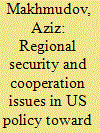

|
|
|
|
|
| Publication |
2012.
|
| Summary/Abstract |
It stands to reason that at the early stage of independence the five republics in the Central Asian region-Kazakhstan, Kyrgyzstan, Tajikistan, Turkmenistan, and Uzbekistan-previously closely linked to the Soviet economic and political systems, faced a number of challenges, most of which were inherited from the Czarist-Soviet regimes. Coping with the challenges posed by the transition period required foreign support, and all the republics, except Turkmenistan, have been engaged in active cooperation with global powers such as the U.S.
|
|
|
|
|
|
|
|
|
|
|
|
|
|
|
|
| 9 |
ID:
170667
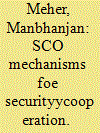

|
|
|
|
|
| Summary/Abstract |
The SCO has become one of the world’s leading political,
economic and security organisations. It considers international
terrorism, national separatism and religious extremism as the
main sources of threat to peace and stability in the region. India
would like to utilise the SCO platform to advance its security interests
and for boosting its outreach to the Central Asian region through
trade and connectivity. Despite a common understanding of the “three
evil forces”, there remains a wide variance, specifically on cross-border
terrorism, amongst SCO members on the one hand and India on the
other. In such a situation, the Government of India finds it very difficult
to explain to the other SCO member states regarding Pakistan’s
involvement in the separatist movement in Kashmir. Hence, only
sharing of information within the framework of the Regional AntiTerrorist Structure (RATS) is possible in the SCO, not a joint struggle
against terror
|
|
|
|
|
|
|
|
|
|
|
|
|
|
|
|
| 10 |
ID:
127665
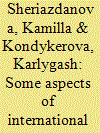

|
|
|
|
|
| Publication |
2013.
|
| Summary/Abstract |
The SCO has become an influential international structure today. Throughout its existence, the Organization has acted as an important mechanism for ensuring regional stability, as well as sustainable political and economic cooperation in the area in which it operates. Today the SCO is playing an increasingly efficient part in building the global security system, which is largely due to the new threats and challenges the world community now faces.
Kazakhstan's chairmanship in the SCO ended with a celebratory sitting of the Council of Heads of Member States held on 15 June, 2011 in Astana. At this meeting, the Astana declaration of the SCO's Tenth Anniversary was adopted, which states that during this time, the Organization has successfully advanced from its institutionalization to the establishment of efficiently functioning mechanisms of interaction in different spheres.
The SCO is a regional international organization, the main tasks of which are strengthening stability and security in the broad area that joins the states belonging to it, fighting terrorism, separatism, extremism, and drug trafficking, developing economic cooperation and energy partnership, and enhancing scientific and cultural interaction.
The SCO is an essentially new model of geopolitical integration that makes it possible to unite the interests of Central Asia, Russia, and China. This statement is based on the experience of the SCO member states that are pooling their efforts to oppose non-traditional threats to security in Central Asia-terrorism, flagrant fundamentalism, drug crimes, and separatism.
Of course, there are political reasons for unifying the countries within the SCO borne by the desire to ensure security in the region, while economic factors predominate in the traditional integration models. In this case, free trade is the springboard for forming a political union.
However, despite the prime importance of the political component in the SCO's activity, it is the economic factors that make it possible to oppose the negative trends in the life of the Central Asian region.
|
|
|
|
|
|
|
|
|
|
|
|
|
|
|
|
| 11 |
ID:
132916


|
|
|
|
|
| Publication |
2014.
|
| Summary/Abstract |
President Obama has continued to emphasise the strategic importance of stable energy supplies to US national security interests, with the oil-rich Central Asian region a key part of global energy markets. This region has seen significant economic and strategic inroads by the United States over the last decade in a broad attempt to integrate it within the US-led liberal order. This article examines these policy developments and draws upon theoretical debates on US grand strategy to argue that, rather than necessarily signalling increasing geopolitical rivalry with other powers such as China and Russia, US policy is designed primarily to incorporate the region through deepening market interdependence. As such, while there is a complex mix of geopolitical rivalry and economic interdependence developing in the Caspian, even in the face of purported US decline and increase of its domestic supplies through fracking, Washington remains committed to acting as a hegemonic stabiliser in the Caspian.
|
|
|
|
|
|
|
|
|
|
|
|
|
|
|
|
| 12 |
ID:
091782
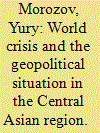

|
|
|
|
|
| Publication |
2009.
|
| Summary/Abstract |
On April 8, 2009, a "round-table" discussion on the subject - development trends of the Situation in central asia and topical Problems of the development Strategy of the Sco in the Present conditions - took place at the Institute for Far Eastern Studies. The discussion was timed to the SCO summit in Yekaterinburg in June.
|
|
|
|
|
|
|
|
|
|
|
|
|
|
|
|
|
|
|
|
|